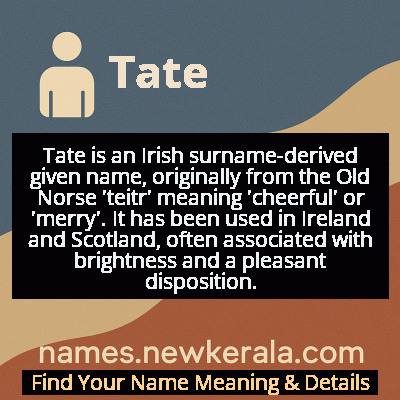Tate Name Meaning & Details
Origin, Popularity, Numerology Analysis & Name Meaning of Tate
Discover the origin, meaning, and cultural significance of the name TATE. Delve into its historical roots and explore the lasting impact it has had on communities and traditions.
Name
Tate
Gender
Male
Origin
Irish
Lucky Number
1
Meaning of the Name - Tate
Tate is an Irish surname-derived given name, originally from the Old Norse 'teitr' meaning 'cheerful' or 'merry'. It has been used in Ireland and Scotland, often associated with brightness and a pleasant disposition.
Tate - Complete Numerology Analysis
Your Numerology Number
Based on Pythagorean Numerology System
Ruling Planet
Sun
Positive Nature
Leaders, ambitious, highly driven, self-reliant, innovative.
Negative Traits
Overly aggressive, domineering, impatient, selfish.
Lucky Colours
Red, orange, gold.
Lucky Days
Sunday.
Lucky Stones
Ruby, garnet.
Harmony Numbers
2, 3, 9.
Best Suited Professions
Entrepreneurs, managers, engineers.
What People Like About You
Courage, determination, leadership.
Famous People Named Tate
Tate Donovan
Actor and Director
Known for roles in 'Friends,' 'The O.C.,' and directing 'Damages'
Tate McRae
Singer and Dancer
Canadian-American pop singer known for hits like 'You Broke Me First'
John Tate
Boxer
Former WBA heavyweight champion (1979-1980)
Allen Tate
Poet and Critic
Pulitzer Prize-winning American poet and member of the Fugitives literary group
Name Variations & International Equivalents
Click on blue names to explore their detailed meanings. Gray names with will be available soon.
Cultural & Historical Significance
Extended Personality Analysis
Individuals bearing the name Tate are often characterized by a unique blend of strength, practicality, and cheerful disposition that reflects the name's dual etymology. The Norse root 'teitr' (cheerful) combines with the land-based occupational meaning to create a personality profile that balances optimism with grounded realism. Tate's typically exhibit natural leadership qualities, displaying confidence and decisiveness in their actions. They approach life with a practical, no-nonsense attitude that makes them excellent problem-solvers and reliable in crisis situations. Their connection to the name's land-based origins often manifests as a strong sense of stability and responsibility - they're the people others turn to for solid advice and dependable support. Despite their practical nature, Tate's usually maintain a positive outlook and warm personality that draws people to them. They tend to be independent thinkers who value both tradition and innovation, respecting established ways while being open to new ideas. This combination of traits makes Tate's particularly effective in careers requiring both creative thinking and practical implementation, from business and engineering to arts and education. Their inherent resilience allows them to navigate challenges with grace, while their cheerful disposition helps maintain positive relationships and work environments.
Modern Usage & Popularity
Tate has experienced a remarkable renaissance in modern naming trends, transitioning from primarily a surname to a popular given name across English-speaking countries. In the United States, the name has climbed steadily in popularity since the 1990s, breaking into the top 500 boys' names in 2000 and continuing its upward trajectory. According to Social Security Administration data, Tate ranked #323 for boys in 2022, with similar trends observed in the UK, Australia, and Canada. The name's appeal lies in its crisp, single-syllable structure that fits contemporary preferences for short, strong names. It's particularly popular among parents seeking gender-neutral options, though it remains more common for boys. Celebrity influence has significantly boosted its visibility - actors like Tate Donovan and musicians like Tate McRae have brought the name into the cultural mainstream. The name's versatility allows it to work well in both formal and casual contexts, while its Celtic roots appeal to parents interested in heritage names. Social media has further accelerated its popularity, with the hashtag #babynameTate generating thousands of posts. Current naming experts predict Tate will continue rising in popularity due to its perfect alignment with modern naming preferences: short, strong, surname-derived, and culturally rich.
Symbolic & Spiritual Meanings
The name Tate carries rich symbolic meanings that extend far beyond its literal translation. As a 'measure of land,' it symbolizes foundation, stability, and rootedness - representing the fundamental elements upon which life is built. This connects to broader metaphors of growth and cultivation, suggesting that individuals named Tate possess the potential to develop and nurture ideas, relationships, and communities. The Norse meaning of 'cheerful' adds a layer of emotional symbolism, representing light, positivity, and the ability to find joy even in challenging circumstances. Together, these meanings create a powerful symbolic profile of balanced strength - the stability of earth combined with the lightness of cheerful spirit. In psychological terms, Tate symbolizes the integration of practical reality with optimistic perspective. The name also carries symbolic weight related to legacy and inheritance, reflecting how land and property represent family continuity through generations. In contemporary contexts, Tate has acquired additional symbolic meanings through cultural associations - particularly with the Tate Modern art gallery, which links the name to creativity, innovation, and cultural preservation. This combination of earthy stability and artistic expression makes Tate symbolically rich, representing both traditional values and forward-thinking creativity in perfect harmony.

